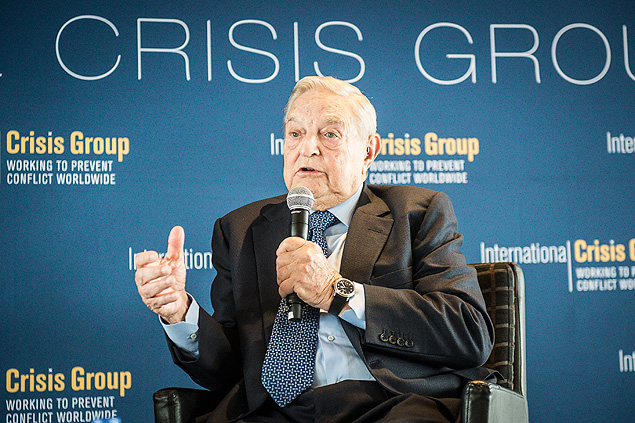Latest Photo Galleries
Brazilian Markets
17h31 Bovespa |
+1,09% | 128.509 |
16h43 Gold |
0,00% | 117 |
17h00 Dollar |
-0,83% | 5,0697 |
16h30 Euro |
+0,49% | 2,65250 |
ADVERTISING
Fiscal Incentive Could Make Philanthropists the Billionaires of Brazil, Says Soros
04/27/2015 - 09h33
Advertising
FERNANDA MENA
SPECIAL ENVOY TO RIO DE JANEIRO
Mega-investor and a major philanthropist, George Soros, 84, was in Brazil last week to inaugurate his foundation's first office in the region, Open Society.
Directed by Pedro Abramovay, former national secretary of Justice (2011), the Latin American branch of the philanthropic organization received some R$ 106 million (U$S 36 million), a small part of the R$ 2.5 billion (U$S 850 million) spent by the foundation in 2014 alone.
The owner of the 29th biggest fortune in the world (US$ 24.2 billion), Soros left the administration of the investment funds that made him rich and famous. He is now more interested in promoting charity and improving his philosophical theory which he says has always guided his businesses and donations.
In an interview to Folha, Soros said that he invests in controversial themes, such as drug legalization, and said that Brazil needs favorable legislation so that it can see its billionaires share part of their wealth.
Folha - You are one of the biggest investors and philanthropists in the world. But the image of speculative capital doesn't match with the idea of altruism.
George Soros - I was a successful administrator of funds, but I couldn't use the money. I only had to multiply it. When I had enough money to become a philanthropist, I did.
Isn't philanthropy just a way of cleaning businesses that cause damage?
That's what usually happens. But I don't think that I had anything to clean with my philanthropy. I have a philosophy that has led me in making money and it guided me to use the money in philanthropy.
What is your philosophy?
I was guided by philosopher Karl Popper [1902-1994] and by his ideas regarding critical thinking and the fact that our understanding of reality is always flawed. I started to confront the economic theory that preaches the efficiency of markets and rational expectations. In the same way that I question the division between politics and economics, which are connected in a reflexive way.
The type of financial market that we have today is the great source of uncertainty because it is neither perfect nor stable. But we need to make decisions. And that generated the tripod on which my philosophy is based: uncertainty, fallibility and reflexivity.
But what does that philosophy have to do with philanthropy?
The philosophy makes me more attentive to the insoluble nature of many problems of the world, which emerge from the contradictions of contemporary society, but which can be adjusted.
For example, it's impossible to have absolute privacy or achieve absolute security against terrorism. It is necessary to make agreements to reconcile both things.
Open Society Foundations was created to involve that which I believe are the main problems that affect humanity and harm especially the most vulnerable people - those who already suffer the most.
Those who criticize you say that you have a secret agenda in the debate on drug legalization. What is your interest?
I believe that the problem of drug addiction doesn't have a solution because, in a way, it's inherent to human nature. Not everybody becomes addicted to drugs, but some people do. And I don't know the solution for that, but I know that the war on drugs, which treats those who are addicted as criminals, has caused more harm that the addiction itself.
One of the foundation's goals is what we call harm reduction. In that case, we show the harmful effects of the war on drugs.
What advances have been made on the issue?
I believe that the legalization of marijuana is virtually assured in the U.S. It has occurred in three states and it will irradiate to the rest of the country.
What's the next step?
We have to do something about the so-called heavy drugs - in those cases, legalization doesn't seem to be a solution. Then, decriminalization seems to be a good answer: separating those who sell it, exploiting addicts' weaknesses, from those who are more vulnerable because they are treated as criminals when they are, in fact, victims.
Brazilian billionaires donate to Harvard and New York's MoMA, but they don't perform philanthropy here. Why?
I believe it is because of Brazil's tax structure. In the U.S., I can donate half of my salary as philanthropy and deduct it from the taxes I pay. The money that would go to the IRS goes to philanthropy, which is a great way to encourage donations. Heavy taxes on inheritances also can be donated as philanthropy. I believe that Brazil needs a similar legislation.
There will be a higher number of Brazilian billionaires willing to do philanthropy if there is favorable legislation. Brazil could increase taxes on inheritances but exempting those who donate that amount as philanthropy. Fees and taxes should be used to redistribute income.
Translated by THOMAS MUELLO
Read the article in the original language
| Wiktor Dabkowski/Xinhua | ||
 |
||
| Soros said that Brazil needs favorable legislation so that it can see its billionaires share part of their wealth |



